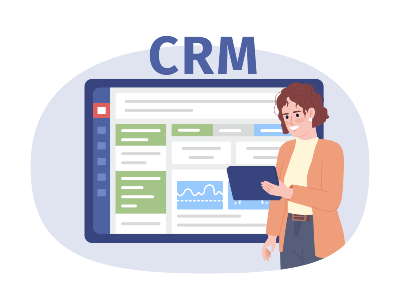The Potential of Omnichannel CRM in Guatemala: A Market Overview

Delivering a seamless customer experience across multiple channels has become crucial for business success in today's rapidly evolving digital landscape. An omnichannel strategy allows companies to be present on various platforms such as WhatsApp, websites, and mobile apps, providing a consistent and high-quality experience to their customers at every touchpoint. This capability not only facilitates the sales process but also strengthens customer relationships by offering multiple avenues for interaction.
A key element in implementing this strategy is the use of an omnichannel Customer Relationship Management (CRM) system. These systems not only support the management of different channels by integrating all interactions into a single platform, significantly enhancing efficiency and customer satisfaction.
What is an Omnichannel CRM?
An omnichannel CRM is a software designed to manage customer relationships across multiple communication channels, including social media, email, live chat, and phone. This type of CRM unifies all customer interactions in one platform, enabling companies to provide a coherent and personalized experience at every touchpoint.
Examples of some Omnichannel CRM: HubSpot and Clientify
HubSpot offers a CRM platform with various tools for marketing, sales, and customer service. With HubSpot, businesses can manage emails, live chats, phone calls, and WhatsApp messages from a single interface. Additionally, HubSpot automates many repetitive tasks and provides detailed analytics to improve marketing and sales strategies.
Clientify focuses on integrating WhatsApp and utilizing artificial intelligence to optimize lead capture and sales management. Clientify simplifies communication through a unified inbox, where messages from different platforms are managed efficiently. It also offers advanced tools for marketing automation and data analysis. For more information, you can contact ILB Metrics.
Comparing Omnichannel CRM with Traditional CRM
The main difference between an omnichannel CRM and a traditional CRM lies in the integration of multiple communication channels. While a traditional CRM focuses on a few channels like email or phone, an omnichannel CRM provides a more comprehensive view of customer interactions, allowing for a more consistent and personalized experience.
An omnichannel CRM adapts its functionality to customer preferences, gathering data from various sources and offering an integrated view of each customer. This contrasts with traditional CRMs, which tend to be more rigid and limited in terms of communication channels and data sources.
Benefits of an Omnichannel CRM
Unified Information: An omnichannel CRM centralizes all customer information in one platform. This enables marketing, sales, and customer service teams to easily access data, improving interaction management efficiency and speeding up responses to customer inquiries.

Optimized Communication: By offering multiple communication channels, an omnichannel CRM allows customers to interact in their preferred way, enhancing their satisfaction and loyalty. This approach is particularly useful for businesses aiming to continuously optimize the customer experience.

Improved Record Keeping: Every interaction with a customer generates detailed records, making it easier to track their history and behavior. This allows businesses to analyze communication patterns and adjust their strategies to better attract and retain customers.

Customer-Centric Focus: By consolidating all interactions in one platform, sales representatives can focus on nurturing customer relationships rather than managing multiple systems. This improves efficiency and the quality of customer service.

Process Automation: An omnichannel CRM automates many repetitive tasks, such as email follow-ups and contact management. This not only saves time but also increases operational efficiency and enhances the customer experience.

How an Omnichannel CRM Enhances Customer Relationships
An omnichannel CRM provides a complete and unified view of all customer interactions, enabling businesses to better understand their needs and preferences. This facilitates faster and more personalized responses, improving customer satisfaction and loyalty.
Additionally, by offering a consistent experience at every touchpoint, from social media to phone calls, an omnichannel CRM strengthens customer relationships and demonstrates a genuine commitment to their comfort and convenience. This consistency not only increases customer satisfaction but also drives business growth through stronger and longer-lasting relationships.
An omnichannel CRM is an essential tool for any business looking to enhance customer relationships and optimize communication and sales processes. With examples like HubSpot and Clientify, it is evident that these platforms offer a variety of functions and benefits that can transform the way businesses interact with their customers, especially in a dynamic market like Guatemala.
